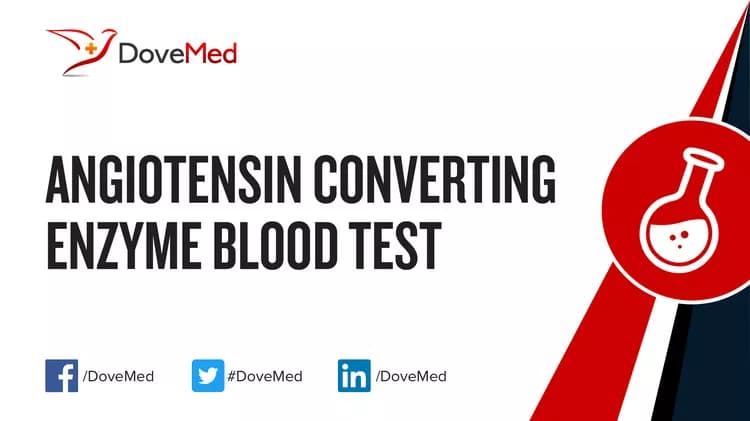What are the other Names for this Test? (Equivalent Terms)
- Angiotensin Converting Enzyme (ACE) Test
- CD143; CD143 Antigen Test
- EC 3.2.1.; EC 3.4.15.1
What is Angiotensin Converting Enzyme Blood Test? (Background Information)
- The ACE (Angiotensin Converting Enzyme) Test is a blood test that is commonly used in diagnosing Sarcoidosis (an inflammatory disease of the lymph nodes andaffecting other body organs) and also in monitoring its condition and/or disease activity
- Sarcoidosis is diagnosed by exclusion. Thus, your physician will eliminate all other diseases/disorders causing the symptoms, before narrowing down on sarcoidosis
- Some of the tests performed to rule out symptoms causing conditions similar to sarcoidosis include, tuberculosis and fungal infection tests. These are normally performed along with ACE blood testing
What are the Clinical Indications for performing the Angiotensin Converting Enzyme Blood Test?
Individuals with the following set of non-specific symptoms that point to sarcoidosis, and when other tests are non-conclusive, may be advised to undergo ACE testing. Those suffering from:
- Prolonged coughing
- Watering, redness of the eyes
- Pain in the joints
- Increased size of lymph nodes in the body
Sometimes a routine chest x-ray performed for other reasons, can reveal enlargement of the lymph nodes in the mediastinum (central portion of the thoracic cavity).
How is the Specimen Collected for Angiotensin Converting Enzyme Blood Test?
- Sample required: Blood
- Process: Insertion of needle into a vein (arm)
- Preparation required: None
What is the Significance of the Angiotensin Converting Enzyme Blood Test Result?
- Given the right clinical situation, an elevated ACE could help confirm sarcoidosis. ACE blood levels are elevated in a patient with sarcoidosis. It is however important to note that an increased ACE level does not always lead to a diagnosis of sarcoidosis
- When an individual has been diagnosed with sarcoidosis; regular and periodic ACE testing is helpful in monitoring the activity of sarcoidosis
- An increasing level of ACE in such a patient diagnosed with sarcoidosis would indicate an increased activity level of the disease. A lower level of ACE in someone with sarcoidosis indicates a decreased activity level of the disease
- Steroids are commonly used to treat sarcoidosis. Once sarcoidosis is confirmed, the patient is prescribed steroidal therapy. On administration of steroidal therapy, if ACE levels decrease, then it is indicative of a positive response to the therapy. In such a situation, the prognosis for the individual is good
- However, sometimes on treatment with steroids, the levels of ACE do not drop, but on the contrary may even show an increase. This indicates a negative response to steroid therapy, leading to poor prognosis for the individual suffering from the condition
Additional and Relevant Useful Information:
- The ACE test is not a stand-alone test for the diagnosis of sarcoidosis
- The interpretation of ACE blood test should always be considered together with the clinical signs and symptoms associated with sarcoidosis. In fact, in some individuals with sarcoidosis, the ACE levels may be normal or even decreased. This could be due to a variety of reasons, including the inactive status of sarcoidosis. Also, there are cases where the body tissue does not produce an increased level of ACE, as one would often see in sarcoidosis
- It has to be noted that individuals on ACE inhibitor drugs will have interference in their testing for ACE levels. Please inform your physician if you are taking such ACE inhibitors, prior to the blood test
An increased level of ACE is linked to many other conditions and disorders too. These include:
- Diabetes mellitus
- Fungal infections, such as histoplasmosis, blastomycosis, and coccidioidomycosis
- Individuals who are diagnosed with HIV/AIDS
- Individualswith hyperthyroidism (those who show elevated thyroid function tests)
- Individuals who suffer from liver fibrosis due to excessive alcohol intake (often called alcoholic cirrhosis)
- Those suffering from mycobacterial infection, such as leprosy and tuberculosis
- Patients with malignant proliferation of lymphocytes (lymphomas)
- Individuals who have an increased thyroid activity (hyperthyroidism)
- Those on chronic corticosteroidal therapy for a variety of reasons including asthma, autoimmune disorders, etc.
- Patients with fibrosis of the lung, or those diagnosed with a lung malignancy
- Patients who have emphysema, and other chronic obstructive pulmonary diseases
- Those who have a longstanding history of smoking
Clinical conditions causing a decrease in ACE levels include:
- Individuals who have an increased thyroid activity (hyperthyroidism)
- Those on chronic corticosteroidal therapy for a variety of reasons including asthma, autoimmune disorders, etc.
- Patients with fibrosis of the lung, or those diagnosed with a lung malignancy
- Patients who have emphysema, and other chronic obstructive pulmonary diseases
- Those who have a longstanding history of smoking
Angiotensin Converting Enzyme (ACE) is an enzyme that converts Angiotensin I to Angiotensin II. Angiotensin II is responsible for constricting blood vessels and in the process, keeps the blood pressure level elevated.
Certain drugs, called Angiotensin Converting Enzyme inhibitors are currently used to treat increased blood pressures. These inhibitors lower the blood pressure by causing the blood vessels to dilate.
Certain medications that you may be currently taking may influence the outcome of the test. Hence, it is important to inform your healthcare provider, the complete list of medications (including any herbal supplements) you are currently taking. This will help the healthcare provider interpret your test results more accurately and avoid unnecessary chances of a misdiagnosis.
Related Articles
Test Your Knowledge
Asked by users
Related Centers
Related Specialties
Related Physicians
Related Procedures
Related Resources
Join DoveHubs
and connect with fellow professionals


0 Comments
Please log in to post a comment.